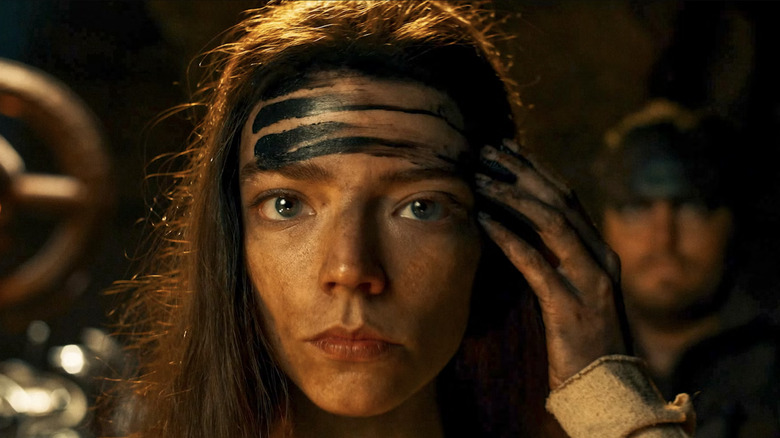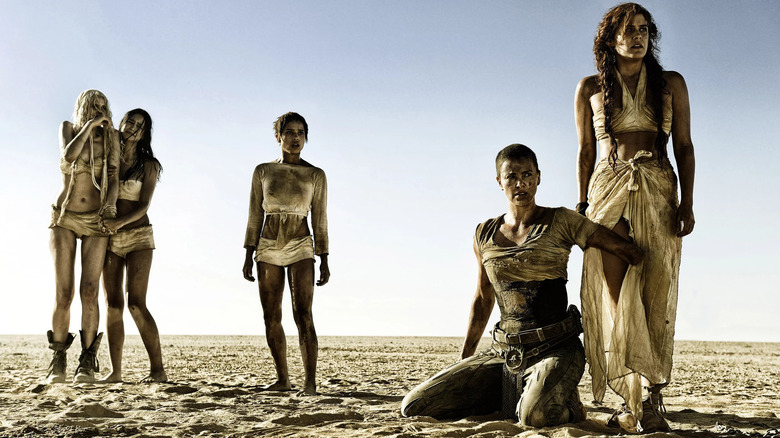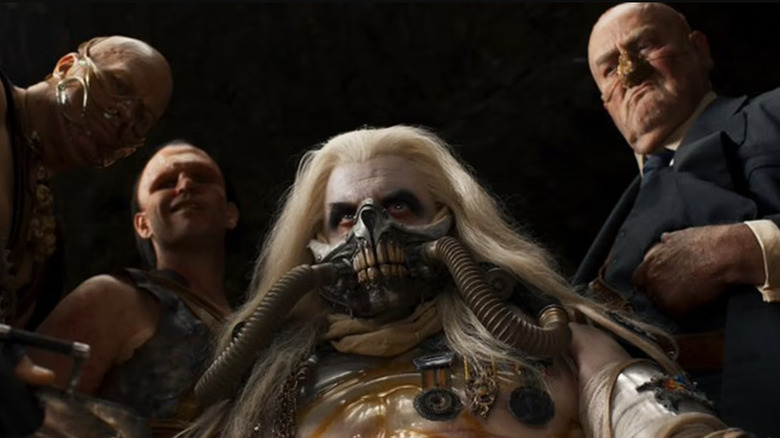Furiosa Avoids The Worst Trope For Women In Post-Apocalyptic Stories
This article contains spoilers for "Furiosa."
When I was 8 years old, I attended a friend's birthday party where we were going to watch "Titanic" on its double-sized VHS. All of our parents had to give expressed permission due to the nude scene, and I'm grateful every day to be the spawn of Cool Parents™ who saw this as a moment for cultural education, but it was a comment from my friend's extremely progressive mother that I think about every time I watch a disaster or post-apocalyptic film. It's when the wealthy Cal Hockley (Billy Zane) grabs a small, poor child and claims to be a single father in an attempt to secure a spot on the lifeboats reserved for women and children. His plan works, and he survives the shipwreck, which encouraged my adult supervision for the evening to scoff and utter, "Leave it to a man to manipulate the only system put in place where a woman's life is given any sort of value."
The conservative patriarchal stranglehold in America has made it next to impossible to be a woman in our society, especially without feeling like absolute trash. The media is constantly bombarding us with contradictory ideas on "how to be a woman," bigots are attempting to legislate trans women out of existence, and politicians use reproductive rights as bargaining chips in election years. Women are deemed "too emotional" to hold positions of power while pregnancy and menstruation are positioned as proof we're "unreliable," but when the world is falling apart in post-apocalyptic or dystopian stories — women are turned into a form of currency.
But in "Furiosa: A Mad Max Saga," director George Miller avoids the worst trope for women in post-apocalyptic stories, even if "Fury Road" has already established a world where it's already happening.
The horror of 'women mean a future'
In Danny Boyle and Alex Garland's "28 Days Later," the treatment of women in a world gone mad is horrifically crystalized. Christopher Eccleston plays Major Henry West, a military man who runs a compound of survivors of the Rage Virus epidemic. Fellow survivors Jim (Cillian Murphy), Selena (Naomie Harris), and Hannah (Megan Burns) follow Major West's radio broadcast in the hopes of a sanctuary, but West confesses to Jim that his intentions for Selena and Hannah might be deemed unsavory:
"Eight days ago, I found Jones with his gun in his mouth. He said he was going to kill himself because there was no future. What could I say to him? We fight off the infected or we wait until they starve to death ... and then what? What do nine men do except wait to die themselves? I moved us from the blockade, and I set the radio broadcasting, and I promised them women. Because women mean a future."
Cis women (and those identifying outside their assigned gender at birth) — specifically those with the capability of reproduction — become as important of a resource as food, water, and shelter in dystopian landscapes. Cis men justify sexual violence as a necessary part of "saving the world," and this so-called "promise of a future" is made without any consideration of the autonomy of those who will be putting their bodies and lives on the line to bring that future to fruition.
And it's not reserved for films in fantastical worlds. In the horror film "It Follows," the economically devastated city of Detroit is the backdrop for a strange curse passed on through sexual contact, where Jay (Maika Monroe) is told by her date that it'll be easier for her to pass on the curse "because she's a girl." Why exactly is it easier? Because men know how the majority of other men behave, and how quickly they'll revert to primal instincts if given the opportunity.
The Brides from Fury Road as breeding stock
In "Mad Max: Fury Road," the audience is introduced to The Five Brides of Immortan Joe, also referred to as "The Breeders," or the women he's selected to give him sons. It's almost a given at this point to expect there to be a plot about women being used as breeding stock in a post-apocalyptic story, but "Fury Road" is centered around gender politics and displays The Brides as women fully aware of their "value." Joe forces them to wear tattered white fabric to highlight their Edenesque purity, and while they are certainly treated better than other citizens of the Citadel ... at what cost? If they can't birth a son (despite the fact the sperm determines the sex of a child), they are milked like cattle.
These women are treated like property but still use themselves as shields during the escape knowing the War Boys will not hurt them because of what they're "worth" to Immortan Joe. The Brides could easily weaponize their sexuality but instead focus on the reality that they are in control of the future. Immortan Joe wants a proper heir, so his desire to keep the women safe comes not from the loss of his beautiful sex slaves, but his quest to continue his familial line. Cis men cannot continue on their own, and the world of "Fury Road" knows it.
Imperator Furiosa (Charlize Theron) steals the War Rig in an attempt to save The Brides, and in the press run leading to "Fury Road," Theron explained that part of the character's backstory was originally supposed to be that Furiosa was selected as one of Joe's brides, but was infertile, and therefore discarded. This gave her the option to work alongside the mechanics and War Pups, learning the ways of the Wasteland, and becoming the type of warrior who could take Immortan Joe down.
But "Furiosa" has modified this backstory for the better.
Furiosa escapes a well-worn trope
"Furiosa" covers nearly 20 years of the titular character's life, from her kidnapping as a child to the exact start of events "Fury Road." And yet even after she is traded from Dementus to Immortan Joe as a young girl, the closest we see to experiencing sexual violence is when Joe's son Rictus Erectus attempts to assault the girl, only for Furiosa to outsmart him and escape to safety — choosing from that moment on to live in disguise as a boy. Even after her identity is made known, she has proven herself to be such a useful figure on the Fury Road, that she is able to stay with Praetorian Jack (Tom Burke) and work on the War Rig. Now, this isn't to say that Furiosa definitively did not experience sexual violence at the hands of the many men who served as her captors over her life, but if it did happen, that pain is not weaponized for shock value or cheaply evoking empathy from the audience in "Furiosa."
Instead, George Miller presents Furiosa as a character who was trained from birth to survive the Wasteland, showcasing survival skills, self-defense, resourcefulness, and yes — how to escape the rampant sexual violence. Raised in the land of the Many Mothers (aka The Vuvalini), Furiosa comes from a community of strong women, and that upbringing courses through all of her decisions. At the same time, the men are still presented as lecherous, disgusting misogynists, and the future for "rejected Brides" is also not kept secret. "Fury Road" established that the Wasteland is not a safe place for women, and "Furiosa" wisely expects the audience to know if money is the root of all evil, in a world where women are currency — only the worst people imaginable are those willing to cash in.
"Furiosa" is now playing in theaters everywhere.



